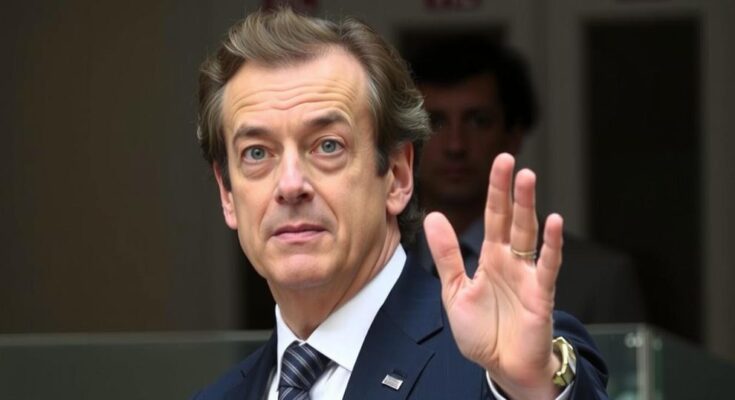Nicolas Sarkozy has begun his trial in Paris over allegations of receiving illicit funds from Gaddafi for his 2007 campaign. He faces accusations alongside twelve others, all of whom deny wrongdoing. This trial is part of a series of legal troubles following Sarkozy’s presidency, with significant implications if he is found guilty.
Former President Nicolas Sarkozy of France has commenced his trial in Paris, facing allegations of having received illicit funds from the late Libyan leader, Colonel Muammar Gaddafi, to finance his campaign for the presidency in 2007. Prosecutors assert that Sarkozy promised assistance to Gaddafi in counteracting his negative standing with Western nations in exchange for these funds. Sarkozy, aged 69, firmly refutes these charges, suggesting that they are the product of a politically motivated conspiracy.
The investigation into these allegations began in 2013, two years succeeding claims made by Saif al-Islam, Gaddafi’s son, who accused Sarkozy of accepting vast sums from his father for his electoral campaign. Subsequent to this, Lebanese businessman Ziad Takieddine claimed to possess documentation indicating that Sarkozy’s campaign was significantly funded by the Libyan government through payments totaling €50 million (approximately £43 million), continuing post his election.
Alongside Sarkozy, twelve others accused of orchestrating the arrangement with Gaddafi are also undergoing trial, all of whom maintain their innocence. Carla Bruni-Sarkozy, Sarkozy’s wife, faced charges last year for allegedly concealing evidence related to the Gaddafi matter, as well as colluding in fraud, charges she also denies.
Since his electoral defeat in 2012, Sarkozy has endured various criminal inquiries and has contested a ruling from February 2024, which found him guilty of overspending on his re-election campaign, resulting in a one-year sentence with six months suspended. In 2021, he was convicted of attempting to bribe a judge, marking a historical first for a French president receiving a custodial sentence. In December, the Paris appeals court permitted him to serve his sentence at home, under electronic tagging, though he was not wearing this device upon arrival in court on Monday. This trial, concerning the alleged financial connections to Libya, is scheduled to last until April 10, with potential consequences of up to ten years imprisonment if convicted.
The current trial of Nicolas Sarkozy revolves around serious allegations that he accepted large sums of money from the Libyan regime under Gaddafi to fund his successful presidential campaign in 2007. This case stems from various investigations initiated after Gaddafi’s regime was overthrown, which brought to light disputed transactions and political dealings between Sarkozy and the Libyan government. These events have not only complicated Sarkozy’s legacy but also highlighted the intersections of politics and financial misconduct in international relationships. This trial represents a significant moment in the realm of French politics and governance, reflecting ongoing scrutiny of former leaders and their legacies in light of past actions.
In conclusion, the trial of Nicolas Sarkozy marks a pivotal moment in French political history, wherein a former president confronts allegations of corruption related to foreign funding. With a complex history involving accusations from various parties and a backdrop of political intrigue, this case raises critical questions about the accountability of public officials. Should Sarkozy be found guilty, the repercussions could extend far beyond personal penalties, potentially influencing future electoral processes and the integrity of political financial systems in France.
Original Source: www.bbc.com




